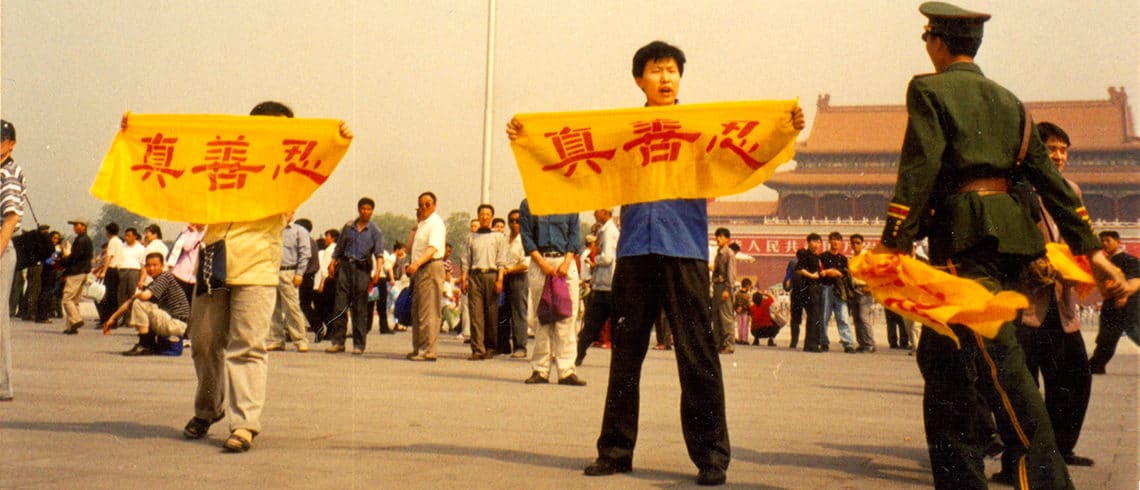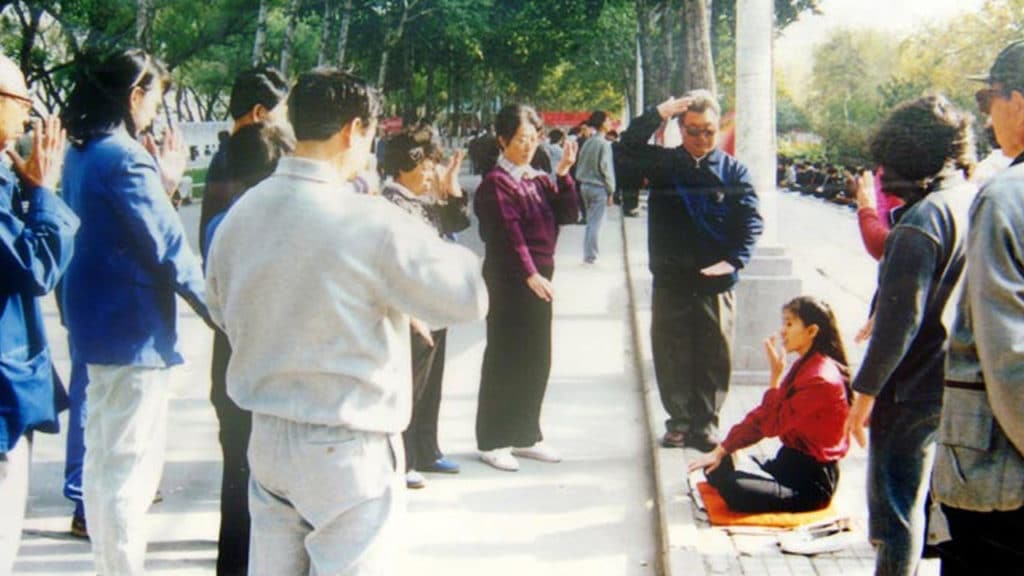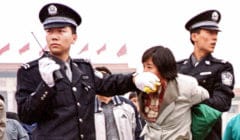
Why is Falun Gong persecuted in China?
Just seven years after being introduced to the public in China, Falun Gong went from being widely popular throughout the country to becoming the number one enemy of the Chinese Communist Party (CCP).
In July 1999, a brutal campaign targeted the 100 million people practicing Falun Gong as well as their relatives, friends and coworkers. In a draconian crackdown not seen since the Cultural Revolution, book burnings, mass-arrests and imprisonment, torture and forced reeducation was unleashed across China. Virtually everyone in China was either targeted or forced to be complicit.
But why? What led up to the brutal crackdown?
The CCP is a totalitarian regime.
The core reason is thought, that the CCP is a totalitarian regime. Even though trying to disguise itself as an authoritarian. What is the difference?
They’re both forms dictatorship. But authoritarian regime still allows certain institutions exist outside of its control. Totalitarian regime, on the other hand, wants to control everything — all public and private life is under absolute control of the ruler, or the Party. It doesn’t allow any competing or opposing views or political parties. Under totalitarian regime, there is no independent press or judicial system. It’s like Leninist or Stalinist systems — they can do anything to you, and if they decide so, they can make you disappear. And so, any independent force in society — be it political, religious, or other, has to be brought under its control, or becomes the enemy.
1. Massive Popularity and Rapid Growth of Falun Gong
Only seven years after its introduction to the public, Falun Gong had become the most popular qigong practice in Chinese history. By 1998, more Chinese people were practicing Falun Gong than there were members of the communist party.
Falun Gong was attracting people from all walks of life, from farmers to university professors, from cultural elites to ranking military and police officers. Even family members of the CCP’s central politburo – the country’s highest CCP governing body – were learning the practice.

70-100 million — A 1998 study conducted by China’s State Sports Commission estimated that over 70 million persons were practicing Falun Gong in China at that time. China’s own state-run T.V. aired a news program around the same time, in which the anchor tells the audience “over 100 million people are learning Falun Gong.” That would mean, in a country of 1.3 billion (at that time), 1 out of every 13 people in the country were practicing Falun Gong.
Some CCP leaders viewed such large and ever-growing numbers as a threat, especially since these figures exceeded the 60 million members of the CCP at that time.
2. Falun Gong’s Complete Independence from Chinese Communist Control
Communism, as a totalitarian ideology, controls all aspects of people’s life, including what they can think and believe. In China, all churches, temples, and even health practices are allowed to operate only under the approval and control of the CCP. And so when Falun Gong was first introduced to the public in China, it also had to be done under the auspices of the state-run China Qigong Science Research Association.
Falun Gong’s founder, Mr. Li Hongzhi, toured China giving lectures for only two years, from 1992 – 1994. Afterwards, the practice continued to spread quickly by word-of-mouth and through an informal network of local volunteers who would teach the practice at public exercise sites.

In 1996, Falun Gong withdrew from the state-run Qigong Science Research Association of China because of pressure to establish a Communist Party branch and charge fees for the practice.
Mr. Li wanted to keep the practice free of political influence. He also wanted it to remain a personal practice that doesn’t have formal membership, and is always shared free of charge.
Consequently, Falun Gong became the largest group outside of the Chinese Communist Party’s control.


“The party attempted to bring all qigong groups under closer control in the mid-1990s. In 1996, the state-run qigong association, with which Falun Gong was linked, called for the establishment of party branches among the practice’s followers and sought to profit from Falun Gong teachings. Li Hongzhi chose to part ways with the association, intending for Falun Gong to remain a personal practice without formal membership and shared free of charge. Falun Gong continued to spread through a loosely knit network of meditation sites and volunteer coordinators across the country.”
3. Falun Gong’s Guiding Principles Incompatible with Communist, Atheist Ideology
Since seizing power in 1949, the CCP has forcibly imposed communist ideals on the Chinese people, especially during the tumultuous Great Cultural Revolution. This forced indoctrination replaced the profoundly spiritual Chinese culture with an ideology of atheism, materialism, and fighting — teaching people to “find joy” in fighting against the heavens, against nature and against each other.
In sharp contrast, Falun Gong’s teaching reintroduced the ancient wisdom of spiritual development, belief in the divine, and traditional values, which together had upheld Chinese civilization for millennia. The core tenets of Falun Gong — Truthfulness, Compassion, and Forbearance — were the exact opposite of communist culture that rules through deceit and struggle.
In short, CCP leaders feared that Falun Gong’s strong moral code could undermine the Party’s violent, Leninist tactics for controlling society.
4. Politburo Leader’s Jealousy and Political Motivations
Former CCP leader Jiang Zemin personally planned, launched, and executed control over the campaign to eliminate Falun Gong, even though other senior leaders opposed the campaign. He did so in a desperate attempt to build up his own power.
Jiang Zemin became leader of the CCP in 1989 mostly due to his support of the Tiananmen massacre, but had very little support inside the party. He was unpopular with the CCP central politburo, and many considered Jiang to be a transitional figure who would be replaced after a few short years
Formerly a mayor of Shanghai, Jiang had a reputation of “trying to look useful, but not getting anything done”. And even among the public, Jiang became a target of mockery for a series of embarrassing displays in front of other world leaders.
While Jiang’s personal image was hurting, and his position in the party remained unstable, Falun Gong grew rapidly, gaining praise and accolades across China, including from many government agencies. Furthermore, Falun Gong ushered in a revival of traditional values — values that the communist regime had been trying to crush for decades.
According to many officials around him, Jiang grew desperate.
Seeking to solidify his power and crush this revival of traditional values, Jiang turned to the tactics used by many CCP leaders of the past. He launched a violent campaign against one segment of the Chinese society to eliminate them, while also scaring the remainder of society into submission and building up his own power.


“The crackdown [against Falun Gong] was undertaken to demonstrate and solidify the power of the Chinese leadership … Communist Party sources said that the standing committee of the Politburo did not unanimously endorse the crackdown and that President Jiang Zemin alone decided that Falun Gong must be eliminated.”
According to the Washington Post, “The crackdown [against Falun Gong] was undertaken to demonstrate and solidify the power of the Chinese leadership … Communist Party sources said that the standing committee of the Politburo did not unanimously endorse the crackdown and that President Jiang Zemin alone decided that Falun Gong must be eliminated.”Citing a Party official, the same story noted that, “This obviously is very personal for Jiang.”
In a February 2001 article, then-CNN senior China analyst Willy Lam wrote that Jiang “seems to be using the mass movement to promote allegiance to himself.”
Twenty plus years later the persecution is still ongoing.



